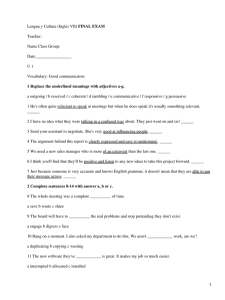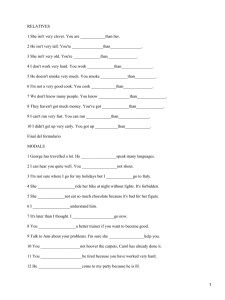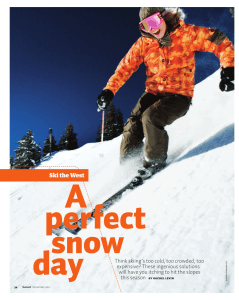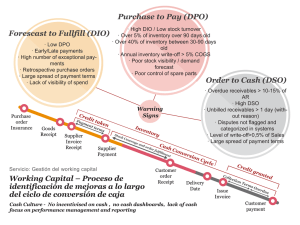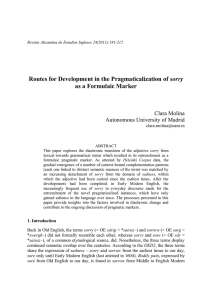1. Being polite, greetings and more
Anuncio
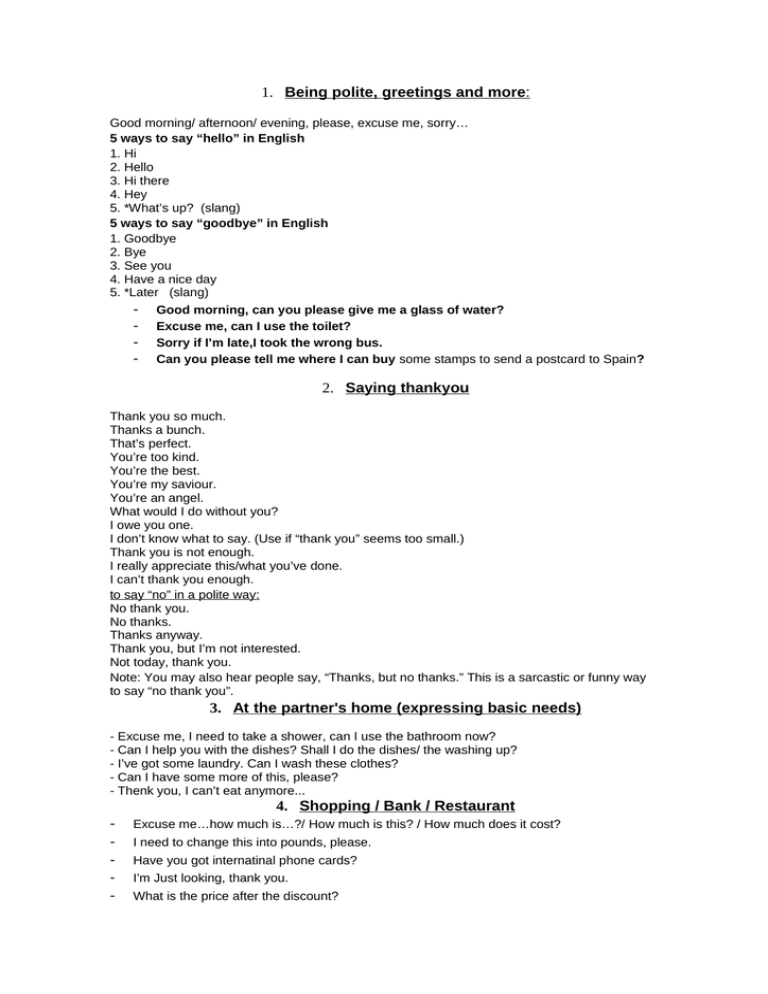
1. Being polite, greetings and more: Good morning/ afternoon/ evening, please, excuse me, sorry… 5 ways to say “hello” in English 1. Hi 2. Hello 3. Hi there 4. Hey 5. *What’s up? (slang) 5 ways to say “goodbye” in English 1. Goodbye 2. Bye 3. See you 4. Have a nice day 5. *Later (slang) - Good morning, can you please give me a glass of water? - Excuse me, can I use the toilet? - Sorry if I’m late,I took the wrong bus. - Can you please tell me where I can buy some stamps to send a postcard to Spain? 2. Saying thankyou Thank you so much. Thanks a bunch. That’s perfect. You’re too kind. You’re the best. You’re my saviour. You’re an angel. What would I do without you? I owe you one. I don’t know what to say. (Use if “thank you” seems too small.) Thank you is not enough. I really appreciate this/what you’ve done. I can’t thank you enough. to say “no” in a polite way: No thank you. No thanks. Thanks anyway. Thank you, but I’m not interested. Not today, thank you. Note: You may also hear people say, “Thanks, but no thanks.” This is a sarcastic or funny way to say “no thank you”. 3. At the partner's home (expressing basic needs) - Excuse me, I need to take a shower, can I use the bathroom now? - Can I help you with the dishes? Shall I do the dishes/ the washing up? - I’ve got some laundry. Can I wash these clothes? - Can I have some more of this, please? - Thenk you, I can’t eat anymore... 4. Shopping / Bank / Restaurant - Excuse me…how much is…?/ How much is this? / How much does it cost? I need to change this into pounds, please. Have you got internatinal phone cards? I’m Just looking, thank you. What is the price after the discount? - What’s the total? Can I have a coke and a ham and cheese sandwich, please? How much is the tax? Is “this” on sale? - How much do I owe you? 5. If you are lost and you need to know where you are or how to get to a place: - Excuse me; do you know where this place is? Excuse me, I’m a student visiting Reykjavik and I need to know where this place is. How far is it to ………………….? How can I go to ………………., please? Which way to ……………………………….? Where is the nearest telephone booth? 6. Ways to Apologise Sorry. I’m sorry. I’m so sorry! Sorry for your loss. (a person or pet died) Sorry to hear that. (after someone shares bad news such as a child’s illness or a job loss) I apologise. (you’ve made an error) Sorry for keeping you waiting. Sorry I’m late. Please forgive me. Sorry, I didn’t mean to do that. (you did something by accident) Excuse me Pardon me I owe you an apology. (your mistake happened a while ago) 7. Your cards and papers Identity card passport: booklet needed to cross a border driver’s license: card needed to drive a car credit card: card needed to pay or reserve (Visa, Mastercard, American Express) Visa: papers needed to work or study airline ticket: paper needed to fly e-ticket: printout of paper needed to fly airport improvement fee/tax: receipt needed to fly parking ticket: receipt to leave your car in a parking lot or space receipt/bill: paper needed to show you paid bankcard (ATM card): card to pay for something from bank account - Can I see your passport? - Do you have a driver’s license? - Do you have any other photo ID? (a second document) - Will that be cash or credit card? - Do you have a working/study Visa? - Do you have an e-ticket? - Did you pay your airport improvement fee/tax? (at boarding gate) - Do you have a receipt? 8. Questions with where: 10 questions travellers ask: 1. Where is the phone? 2. Where is the bank? 3. Where is the washroom? (also called toilet, bathroom, ladies’ room, mens’ room) 4. Where is the Internet cafe? 5. Where can I get a taxi? 6. Where is the bus stop? 7. Where is the hotel? 8. Where is the doctor’s office? (hospital, walk-in-clinic) 9. Where is the shopping centre? 10. Where can I park? (put the car) A polite way to ask the same question is: “Excuse me. Can you tell me where the ________ is?” OR “Excuse me. Is there a ___________ nearby?” 9. Time. Questions with when: Here are 10 questions travellers often ask: 1. When does the next bus arrive? 2. When does the bus/plane leave? 3. When does the show start? 4. When does the store/restaurant/place open? 5. When are you leaving? 6. When should I go to the gate? (to board airplane) 7. When will you be here? 8. When should we meet? 9. When is breakfast/lunch/dinner? (eat) 10. When is checkout time? (time to leave hotel) To understand the answers, you need to understand how to tell the time in English. Here are answers you will hear to the questions above: at noon OR at twelve o’clock OR at twelve pm (12:00 pm) at five past twelve OR at five after twelve OR at twelve oh five (12:05) at quarter past/after twelve (12:15) at twenty past/after twelve (12:20) at twelve thirty OR at half past twelve (12:30) at twenty to one OR at twelve forty (12:40) at quarter to one or at twelve forty-five (12:45) at twelve fifty (12:50) at one-o-clock (1:00) at midnight (12:00 am) around midnight (sometime between 11:45-12:15 am) When you ask the time, use “what”: “What time is it?” The answer starts with 10. Over my Head: 10 Idioms Tour Guides Use Not every tour comes with a translator. Tour guides may use English expressions that you don’t understand. Here are 10 to learn before you sign up for a tour. 1. travel light: Don’t pack a lot of items. Bring only what you need. Please travel light tomorrow. We have a lot of walking to do. 2. hit the road: Depart. Begin a tour. We’ll hit the road as soon as the bus driver arrives. 3. off track OR off the beaten path: wrong way; away from the main road or route Don’t go off track. There are some dangerous areas in this city. 4. watch your back: be careful; pay attention to people around you Keep your wallet in a safe place and watch your back on the subway. 5. call it a day: finish an activity or tour; go home or back to the hotel You all look tired. Let’s call it a day. 6. get a move on: go more quickly We’ll need to get a move on if we want to catch the four o’clock bus. 7. a full plate: a full schedule; no free time We have a full plate tomorrow, so get a good rest tonight. 8. bright and early OR first thing: very early in the morning We’ll need to leave bright and early to catch the first ferry. 9. hang on or hang tight: wait patiently for a moment Please hang tight until the driver returns. 10. If worse comes to worst OR If all else fails…: introduces the action to take when no other option is successful. If worse comes to worst, call the police. Bonus Idiom for Tourists: Here is an idiom you can use when you don’t understand the tour guide’s instructions: That went over my head: I didn’t understand what you said. Sorry. That went over my head. Can you say that again, please?
